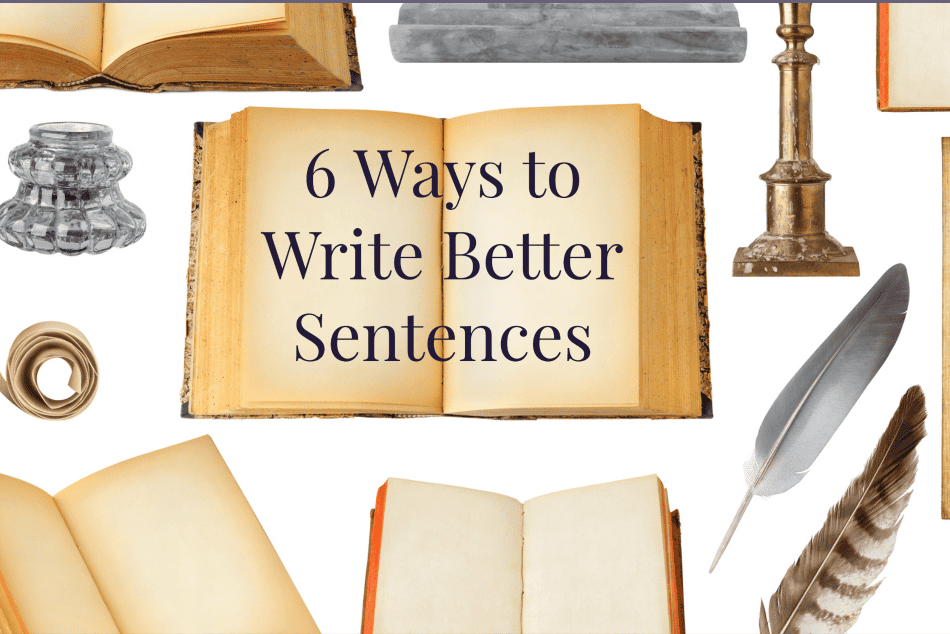Many authors become inspired and have great expectations, but then their writing gets in the way of telling a story. It all comes down to the sentence level, but what makes a good sentence?
The quick answer—one that should be taught in grammar classes if there were grammar classes—is that a sentence should convey a complete thought with a noun and a verb; it should have a capital letter at its start and a period at its end.
Charles writes.
This gets a job done with utility, though greater complexity is usually desired. Good sentences also convey a mood or paint a picture. A sentence describing a romantic stroll through fragrant park may take the reader down this path, then that one, signaling a languorous mood.
But back to nuts-and-bolts strategies to construct better sentences.
- Avoid empty words.
Each part of a sentence should add to its meaning. When a sentence begins with “There are…” or “There is…” the extra words add nothing.
These are sometimes referred to as “empty words.” More examples can be found here.
Sometimes called “expletives,” they—like swear words—can add emphasis but essentially take up space while not adding meaning. The most common expletives are “there,” “here,” “it”—followed by a verb, such as “there are,” “there will be,” “here is,” and “it is.” Other examples of empty words are “indeed,” “in fact.”
A better sentence is almost always possible when you rework “There is…” “There are..”
There is an escaped convict hiding in the cemetery.
There is an escaped convict is hiding in the cemetery.
An escaped convict is hiding in the cemetery.
I took a step back, beginning to fear for my life.
I took a stepped back, beginning to fearing for my life.
I stepped back, fearing for my life.
Trim words that don’t add meaning, creating more forceful and engaging sentences.
- “A” and “one” are not interchangeable.
Mr. Jaggers knows one person who supports him.
Mr. Jaggers knows a person who supports him.
These sentences mean different things. “One person” suggests Mr. Jaggers is counting how many people support him rather than referring to “a person”—a single benefactor with a generous nature.
- Use modifiers to make more effective sentences.
A modifier is a word or phrase that describes or adds meaning to another word in the sentence. They add color and depth to your sentence. Ideally, a modifier is placed as close as possible to the word it is modifying.
His affection for her was surprising to all, given how aloof and rude Estella was.
His affection for her was surprising to all, especially given how aloof and rude Estella was.
“Particularly” or “especially” may draw attention to what the point of a sentence actually is.
Having injured his right hand, it was difficult to box with Herbert. The modifier isn’t modifying anything. It’s unclear whose hand is injured. A dangling modifier is a phrase or clause—“Having injured his right hand”—that is not logically related to the words that follow. Here’s a better way to put it: Having injured his right hand, Pip had difficulty boxing with Herbert. One more example of Dangling-Not-to-Do’s: While walking across the street, the carriage hit her. How to fix? Make the subject in the sentence—a newly added “she”—match the modifier “while walking across the street.” While she was walking across the street, the carriage hit her. Or:
The carriage hit her while she was walking across the street.
- Don’t use too many words.
And Pip needs to watch his back now, since, as mentioned before, he might be being stalked by Orlock who also attacked his sister. But that is a whole other issue that we’ll get to later.
That seems like a lot of words—a lot of extra words. Let’s whittle it down. How to fix?
And Pip needs to watch his back now, since, as mentioned before, he might be being stalked by Orlock who also attacked his sister. But that is a whole other issue that we’ll get to later.
So then: Pip needs to watch his back since he might be being stalked by Orlock.
Or better yet: Pip needs to watch his back now since Orlock may be stalking him.
- Avoid run-ons.
For clarity’s sake, you might want to break up one long, slightly confusing sentence into two or more better sentences.
A few hours later I was in the rowboat, about to take him out to the steamboat, when there was a shout and the police boat appeared before us.
Shorter, sweeter?
I was rowing him out to the steamboat when I heard a shout. The police boat suddenly appeared before us.
We stay in first-person “I” for the entire first sentence, then the police boat gets its own sentence.
- Consider the meaning of sentences and punctuate accordingly.
In the moonlit ruins of Satis House Pip was trembling when he saw Estella and he couldn’t speak. A low moan escaped from his mouth. He tried to stand but quickly had to sit back down because the room was spinning.
The mood of this passage suggests punctuating and breaking longer sentences into more effective shorter sentences.
In the moonlit ruins of Satis House, Pip was trembling when he saw Estella. He couldn’t speak. A low moan escaped from his mouth. He tried to stand but quickly had to sit back down. The room was spinning.
Sentences are building blocks that make paragraphs that then make chapters that make books. A good sentence has flow and is easy to understand; it has rhythm and works with the sentences surrounding it.
Annie Lamott’s writing advice classic Bird by Bird urges writers to start small, building a story from specific events in great detail. This might be said of sentences too.
Write one great sentence at a time, and enough of them, brilliantly assembled, will make a book. The End.
Any questions or advice on sentence-making? Please share with us on Facebook!





